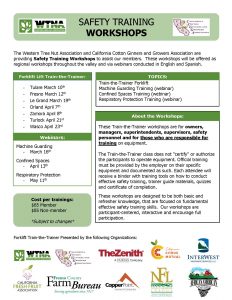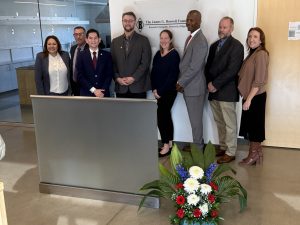It’s that time of the year again! The Association is gearing up for the 2026 regional Train-the -Trainer workshops.
This year the California Cotton Growers Association, The Zenith, Fresno County Farm Bureau, Nisei Farmers League, California Fresh Fruit Association, California Citrus Mutual, InterWest Insurance Services, CopperPoint Insurance Companies, African American Farmers of California, and the Western Tree Nut Association are partnering to provide Forklift Safety Train- the-Trainer workshops.
Beginning in March, these bilingual (English and Spanish) trainings will include seven in-person Forklift Train-the-Trainer workshops held in the following locations: Fresno, Tulare, Wasco, Le Grand, Turlock, and two additional locations in Zamora and Chico (these two locations TBD).
These workshops are designed for owners, managers, supervisors, safety personnel, and individuals responsible for employee training. Each participant will receive a comprehensive binder with the materials needed to understand applicable rules and regulations and to conduct effective forklift safety training. Attendees who complete the full class will also receive a certificate of completion.
In addition to the in-person workshops, the Association will host Machine Guarding, Confined Spaces, and Respiratory Protection webinars later this spring.
Training Cost:
- $65 per person (members)
- $85 per person (non-members)
For registration details and additional information about the workshops and webinars, please refer to the event flyer or visit https://ccgga.org/.



